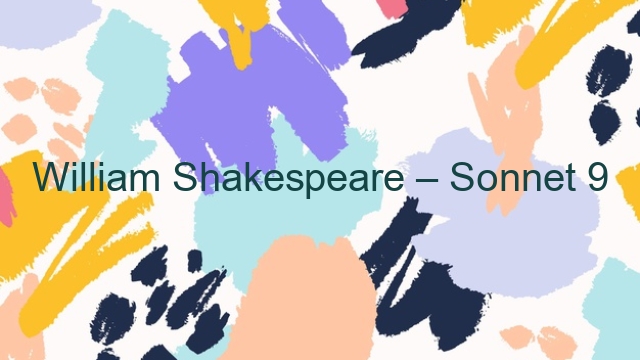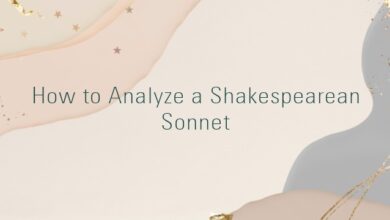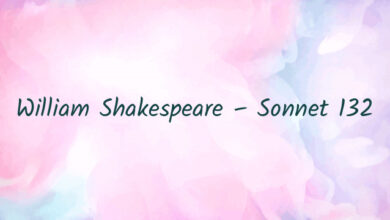
William Shakespeare – Sonnet 9
Is it for fear to wet a widow’s eye,
That thou consum’st thy self in single life?
Ah! if thou issueless shalt hap to die,
The world will wail thee like a makeless wife;
The world will be thy widow and still weep
That thou no form of thee hast left behind,
When every private widow well may keep
By children’s eyes, her husband’s shape in mind:
Look what an unthrift in the world doth spend
Shifts but his place, for still the world enjoys it;
But beauty’s waste hath in the world an end,
And kept unused the user so destroys it.
No love toward others in that bosom sits
That on himself such murd’rous shame commits.
The poet asks if it is fear of making someone a widow that causes the young man to refuse to marry. The argument is unsound, says the poet, for a beautiful youth must leave behind him a form or copy of himself, otherwise the world itself will endure widowhood, and yet have no consolation for its loss. For it will not be able to view the young man resurrected in the eyes of his children. If he persists in this single obduracy, it is an unforgivable shame, showing lack of love to others and equivalent to murdering himself and all his heirs.
The 1609 Quarto Version
IS it for feare to wet a widdowes eye,
That thou conſum’ſt thy ſelfe in ſingle life?
Ah;if thou iſſuleſſe ſhalt hap to die,
The world will waile thee like a makeleſſe wife,
The world wilbe thy widdow and ſtill weepe,
That thou no forme of thee haſt left behind ,
When euery priuat widdow well may keepe,
By childrens eyes,her husbands ſhape in minde:
Looke what an vnthrift in the world doth ſpend
Shifts but his place,for ſtill the world inioyes it
But beauties waſte hath in the world an end,
And kept vnvſde the vſer ſo deſtroyes it:
No loue toward others in that boſome ſits
That on himſelfe ſuch murdrous ſhame commits.
Commentary
1. Is it for fear to wet a widow’s eye,To wet a widow’s eye = to cause your future wife to weep for you (if you should die after marrying her).2. That thou consum’st thy self in single life?
That you waste away in bachelorhood. There is also a sexual meaning in consum’st. See notes to 3.7-8;4.9 etc.3. Ah! if thou issueless shalt hap to die,issueless = childless, without issue, without children.
shalt hap to = should happen to.4. The world will wail thee like a makeless wife;
The world will wail thee = the world will mourn for you;
like = as if it (the world) were; as if you, (the youth) were; the latter meaning is obviously not so relevant, but the youth, being unmarried, could be perceived as being in the same state as a widow.
a makeless wife = a wife without a mate, one who has been widowed. make = companion or mate, spouse (obs.). The argument therefore is that, if the man does not marry, although he will not leave a widow behind him in the conventional sense, should he die, yet the world will be his widow instead, an even greater tragedy than if he were in fact married and with children. The world will mourn him as a makeless wife mourns her husband. The idea is expanded in the following lines.5. The world will be thy widow and still weepstill = always, continually.
6. That thou no form of thee hast left behind,That = because;
form of thee = copy or image of yourself, in the form of a child. See Sonn.11:
She carved thee for her seal, and meant thereby
Thou shouldst print more, not let that copy die.7. When every private widow well may keepprivate – as opposed to the public widow, which is the world. There is also a suggestion of ordinary, as well as ignoble, derived from the Latin privatus.8. By children’s eyes, her husband’s shape in mind:By children’s eyes = by looking at her children. The eyes represented the whole person, so the children’s eyes are the children themselves. See note to gaze 5.2. The widow may keep the husband in mind by looking on the children, who bear his form and image.9. Look what an unthrift in the world doth spendLook what = whatever, anything that. Some editors emend to Look! what etc. but it does not improve the sense. See Sonn.77:
Look what thy memory can not contain
an unthrift = a prodigal person, a wastrel, one of extravagant expenditure. The line therefore expands to ‘Everything that a prodigal chooses to spend in the world’.10. Shifts but his place, for still the world enjoys it;Shifts but his place = Simply moves from one place to another. his = its and refers to the money which the unthrift spends. its as possessive pronoun was not used by the Elizabethans. The money that the prodigal spends becomes available again through circulation. It merely shifts its place from one pocket to another.
for still the world enjoys it = the world continues to make use of it and to derive pleasure from it. still = continually, always, as in line 5.11. But beauty’s waste hath in the world an end,beauty’s waste = the dissipation of beauty, beauty’s squandering of itself (by existing and doing nothing and failing to procreate). In contrast to the prodigal’s expenditure, beauty’s waste does not recirculate. There is a sexual meaning, in which beauty’s waste = semen. See the following line.12. And kept unused the user so destroys it.The contradiction in this line makes it difficult to interpret, because if something is unused there can be no user. One suggestion is that user = prodigal, another that user = one who is entitled to use something. The more obvious meaning is the sexual one that the self-abuser (user) destroys his semen (beauty’s waste) by not using it properly, and by not making some chaste maid fertile.13. No love toward others in that bosom sitsThere is no love in your heart towards others.
sits = exists, is present.14. That on himself such murd’rous shame commits.That picks up thatbosom of the previous line, where it = that person, that heart. Hence the meaning becomes ‘…exists in that heart which, against itself etc.’ himself = itself.
such murd’rous shame – the shame of not begetting an heir. Rather excessive language for such a fault, one would think, but there is also the sexual innuendo where murderous shame means killing the seed by masturbation, and the exaggerated language thereby takes on a slightly humorous flavour.






